Are you a Quiet Speculation member?
If not, now is a perfect time to join up! Our powerful tools, breaking-news analysis, and exclusive Discord channel will make sure you stay up to date and ahead of the curve.
Happy (almost) Independence Day America! For Fireworks Day Eve, I have been inspired to go back to the Beginner's Guide. Recent spoiler discussions and in-game observations made me realize that I have a lot more Modern basics to cover. I've danced around this a few times, but never actually discussed building a Modern sideboard. I'm not talking about the strategy or process this time. This article is about picking the right cards.

Disenchant, Negate, and Duress are examples of cards seemingly tailor-made for the sideboard, and too narrow for the main. Identifying a clear sideboard card is foundational knowledge. Knowing which cards belong in a particular sideboard, however, is less obvious.
I have been surprised by the number of players, including very good ones, whose tournament winning sideboards have cards they didn't need. Not cards that they didn't bring in ever because the right matchup never came up, but cards that even in the right matchup weren't going to be relevant. Especially in a format as diverse as Modern, every sideboard slot is precious. Therefore, it is imperative that every slot is as impactful as possible. Players must be certain that the cards they play in the sideboard perform as intended and have a relevant impact in a match.
Beyond the Basics
The basic rule of sideboarding is to remove irrelevant cards for relevant ones. That's not particularly helpful or clear, so most players remember that rule as "take out dead cards, bring in answers." In many ways that is true, but it's not the actual point of sideboarding. The goal is to readjust your deck's gameplan based on your opponent's to ensure your victory. There are many ways of accomplishing this goal, but the key is ensuring the card 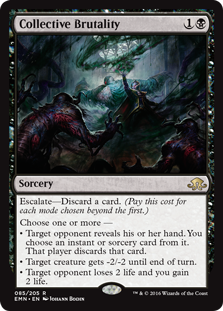 brought in to accomplish that job actually does that job. It's not enough to have cards that are theoretically good in a matchup. Sideboard cards need to actually, and substantially, disrupt the opposing gameplan or protect/advance your own gameplan given the opposing strategy.
brought in to accomplish that job actually does that job. It's not enough to have cards that are theoretically good in a matchup. Sideboard cards need to actually, and substantially, disrupt the opposing gameplan or protect/advance your own gameplan given the opposing strategy.
For example, it is certainly true that discard spells are disruptive against Storm. The deck needs a critical mass of spells to combo off and discard denies this to Storm. However, given enough time, discard becomes irrelevant, as Storm can simply build up a critical mass in the graveyard and win via Past in Flames.
The key is using discard as a tool to buy time to find a clock. A common mistake players make is to pack more discard spells for the matchup and expect that to be enough. Additional discard is a linear addition in that it reinforces Plan A from game one, but a good Storm player will anticipate and adapt to that strategy, making it less effective.
Mistaking Impactful and Effective
Another common mistake is simply using the wrong cards in a matchup. Sideboard cards need to be as impactful as possible. Ideally, each card will win the game if unanswered, but even when that isn't possible, cards should be as impactful as possible. Resolving a sideboard spell should have a noticeable effect on the game. This is fairly obvious. What isn't obvious is that just because a card is impactful doesn't also make it effective. The sideboard card should have a significant impact on the game, but it also has to accomplish something in the matchup.
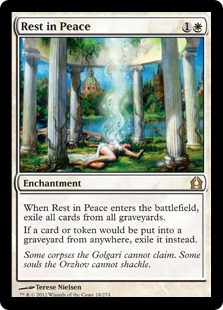 Consider Rest in Peace, a classic sideboard card. When it hits the board, Rest takes away both players' graveyard. This is a fundamental change to the game and ensures an impactful play. But does it mean anything? That is entirely contextual. Obviously this is backbreaking against Dredge and meaningless against Humans, but it gets murky in between those extremes.
Consider Rest in Peace, a classic sideboard card. When it hits the board, Rest takes away both players' graveyard. This is a fundamental change to the game and ensures an impactful play. But does it mean anything? That is entirely contextual. Obviously this is backbreaking against Dredge and meaningless against Humans, but it gets murky in between those extremes.
Mardu Pyromancer relies on its graveyard to cast Bedlam Reveler and sometimes Gurmag Angler and uses it as a value engine with Faithless Looting, Kolaghan's Command, and Lingering Souls. Therefore it is a very graveyard-centered deck, and Rest is an effective sideboard card. Meanwhile, Jeskai Control has Snapcaster Mage and Search for Azcanta as graveyard cards, and that's all. RiP reduces those cards' value, but doesn't remove their impacts completely, rendering such dedicated graveyard hate ineffective.
How to Evaluate Sideboard Cards
Sideboard cards must substantially and relevantly disrupt the opposing gameplan or advance your own plan in the matchup. There will be exceptions and corner cases, but this is the general principle. To actually determine whether this is what my sideboard is doing, I have some rules:
- Does this card actually cripple my opponent's deck? i.e. Stony Silence against Affinity.
- Does this card significantly hamper my opponent's gameplan? i.e. Kor Firewalker against Burn.
- Does this card directly answer my opponent's gameplan? i.e. Anger of the Gods against Humans.
- Does this card protect me from part of their gameplan that I need to care about? i.e. Leyline of Sanctity in Bogles against Jund.
- Do I need this card to not lose to their sideboard cards? i.e. Nature's Claim against Stony Silence in Ironworks.
- Do I need this card for my own gameplan? i.e. Dispel and Geist of Saint Traft in my Jeskai Tempo deck against control.
- Does this card play well with my own gameplan? i.e. Not Grafdigger's Cage against Dredge out of a Collected Company deck.
- By playing this card, do I eliminate the need for other cards? i.e. Engineered Explosives instead of dedicated creature removal.
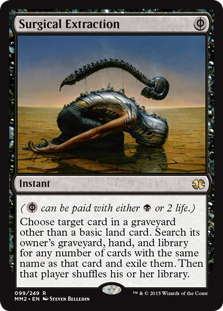 I want each card to answer yes to as many of these rules as possible, but it isn't necessary to have more than two if that yes is strong enough. This is because the only one that is immovable is #7. Sideboard cards need to harm the opponent more than you, and preferably only your opponent. If I'm getting hit by my own card, it had better be because I really need that effect and there aren't other options, or because I can mitigate the impact. I've run Blood Moon in Jeskai before because I couldn't beat Valakut, the Molten Pinnacle decks otherwise. I did get hurt, and sometimes severely, but by planning ahead and compulsively fetching basics, I made it work. It wasn't optimal, but nothing else worked and sometimes that's as good as it gets.
I want each card to answer yes to as many of these rules as possible, but it isn't necessary to have more than two if that yes is strong enough. This is because the only one that is immovable is #7. Sideboard cards need to harm the opponent more than you, and preferably only your opponent. If I'm getting hit by my own card, it had better be because I really need that effect and there aren't other options, or because I can mitigate the impact. I've run Blood Moon in Jeskai before because I couldn't beat Valakut, the Molten Pinnacle decks otherwise. I did get hurt, and sometimes severely, but by planning ahead and compulsively fetching basics, I made it work. It wasn't optimal, but nothing else worked and sometimes that's as good as it gets.
#4 is most commonly-broken rule. When talking about decks and sideboard strategies, I frequently hear players mention that this card is in their sideboard "just in case," or "because I need something." The exchange goes something like this:
Me: Just in case what?
Them: If I hit Storm I need graveyard removal, so I have Surgical Extraction.
Me: I just saw you Extract Storm three times and you still lost handily.
Them: Yeah, Storm is a terrible matchup.
Me: Functionally unwinnable or unfavorable?
Them: Haven't won a match in weeks.
Me: Why are you using sideboard slots to try if it's unwinnable in the best case scenario?
Them: I need something against Storm.
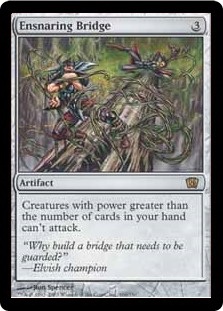 The player from this story eventually gave in to my line of thinking and stopped running Surgical and switched to the more versatileNihil Spellbomb. Storm's still terrible, but his Mardu Pyromancer matchup improved.
The player from this story eventually gave in to my line of thinking and stopped running Surgical and switched to the more versatileNihil Spellbomb. Storm's still terrible, but his Mardu Pyromancer matchup improved.
Frequently, players worry about parts of opposing strategies that aren't relevant to their deck; Burn doesn't really need to answer Ensnaring Bridge and Merfolk doesn't care how fast it gets Blood Mooned. Having answers for these cards is fine as long as they weren't boarded in specifically because of them. Burn may bring in Smash to Smithereens against a Bridge deck because of other targets, but Bridge itself doesn't stop Burn from winning. Don't try and answer parts of a strategy that don't impact your own gameplan or just win your opponent the game. Focus only on what matters.
It Takes Two
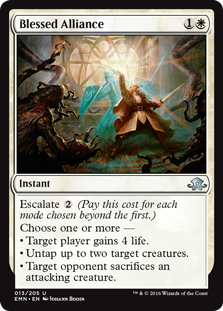 One complication is that Magic is a game between two players. I am thinking about how my deck interacts with my opponent and how to sideboard against them, and so are they. Sometimes this can be used against them, but it's not always possible. Instead, sideboard with the opponent's plan in mind. Playing Merfolk against UW Control, I know that the game will be about sweepers and lifegain. Spot removal is thin, and counters may not be relevant thanks to Aether Vial and Cavern of Souls. I can't do much against Supreme Verdict, but will fight Blessed Alliance and Wrath of God. My opponent will make the game about those cards, so I need to prepare accordingly. Tournament Magic is different from testing. The strategy that works well in testing may not survive an opponent with different matchup vision and perspective, so be flexible.
One complication is that Magic is a game between two players. I am thinking about how my deck interacts with my opponent and how to sideboard against them, and so are they. Sometimes this can be used against them, but it's not always possible. Instead, sideboard with the opponent's plan in mind. Playing Merfolk against UW Control, I know that the game will be about sweepers and lifegain. Spot removal is thin, and counters may not be relevant thanks to Aether Vial and Cavern of Souls. I can't do much against Supreme Verdict, but will fight Blessed Alliance and Wrath of God. My opponent will make the game about those cards, so I need to prepare accordingly. Tournament Magic is different from testing. The strategy that works well in testing may not survive an opponent with different matchup vision and perspective, so be flexible.
Cases in Point
Core 2019 is on the horizon, and that set has a number of interesting potential sideboard cards. Whether they're actually good isn't immediately obvious, so I will use them to demonstrate how I see sideboard cards.
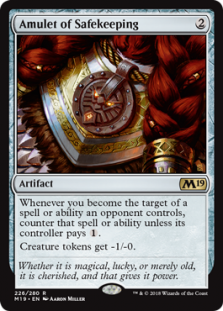 Amulet of Safekeeping - Probably the most talked about card, Amulet of Safekeeping is clearly designed to answer Storm. The first ability Mana Tithes anything that targets you (meaning Grapeshot) and the second blanks 1/1 tokens (meaning Empty the Warrens).On paper that is fine, but Amulet only protects against Storm's win conditions. Storm is still free to combo off, during which it can tutor for an answer with Gifts Ungiven and win anyway. Thus, the card doesn't actually disrupt Storm's gameplan nor protect you from Storm. As an answer to Mardu Pyromancer, Amulet may seem more promising, but Mardu can easily pay the tax or use Kolaghan's Command. Because it doesn't actually accomplish its stated goal, Amulet is not a good sideboard card.
Amulet of Safekeeping - Probably the most talked about card, Amulet of Safekeeping is clearly designed to answer Storm. The first ability Mana Tithes anything that targets you (meaning Grapeshot) and the second blanks 1/1 tokens (meaning Empty the Warrens).On paper that is fine, but Amulet only protects against Storm's win conditions. Storm is still free to combo off, during which it can tutor for an answer with Gifts Ungiven and win anyway. Thus, the card doesn't actually disrupt Storm's gameplan nor protect you from Storm. As an answer to Mardu Pyromancer, Amulet may seem more promising, but Mardu can easily pay the tax or use Kolaghan's Command. Because it doesn't actually accomplish its stated goal, Amulet is not a good sideboard card.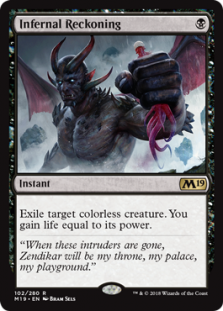 Infernal Reckoning - While I would have appreciated this card two years ago, these days Infernal Reckoning is not a good sideboard card. It answers any Eldrazi at a very good rate, but that's all. It doesn't really cripple or disrupt the strategy, and one-for-one trades aren't exciting as sideboard cards. There's a reason control decks side in sweepers instead of Terminate against creature decks. Swords to Plowshares is a very good card, but there's no reason to only have it in the sideboard. If Eldrazi Tron was more prevalent, I could see an argument for Reckoning. As is, it's too narrow and low impact to be justified.
Infernal Reckoning - While I would have appreciated this card two years ago, these days Infernal Reckoning is not a good sideboard card. It answers any Eldrazi at a very good rate, but that's all. It doesn't really cripple or disrupt the strategy, and one-for-one trades aren't exciting as sideboard cards. There's a reason control decks side in sweepers instead of Terminate against creature decks. Swords to Plowshares is a very good card, but there's no reason to only have it in the sideboard. If Eldrazi Tron was more prevalent, I could see an argument for Reckoning. As is, it's too narrow and low impact to be justified.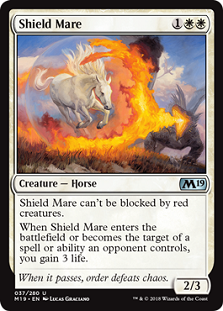 Shield Mare - On the other hand, I could see myself boarding in Shield Mare against Burn in the right deck. While not the most potent hate card, Mare does substantially disrupt the opponent and/or protect against Burn's gameplan, depending on how you evaluate lifegain. Mare also trades for an entire burn spell when it enters and happily blocks all Burn's creatures. Atarka's Command sees no play anymore, so the only way to kill Mare without triggering her is via prowess triggers on Monastery Swiftspear. Kor Firewalker may do that more cheaply, but it has the weakness of Path to Exile killing it for no value, whereas Mare still gains life when targeted. I'd certainly try Mare in Death & Taxes.
Shield Mare - On the other hand, I could see myself boarding in Shield Mare against Burn in the right deck. While not the most potent hate card, Mare does substantially disrupt the opponent and/or protect against Burn's gameplan, depending on how you evaluate lifegain. Mare also trades for an entire burn spell when it enters and happily blocks all Burn's creatures. Atarka's Command sees no play anymore, so the only way to kill Mare without triggering her is via prowess triggers on Monastery Swiftspear. Kor Firewalker may do that more cheaply, but it has the weakness of Path to Exile killing it for no value, whereas Mare still gains life when targeted. I'd certainly try Mare in Death & Taxes.
Just the Beginning
This is intended to provide a general guideline for less experienced players. There are a lot of exceptions and nuance that more experienced players understand, but this is not the place to discuss them. There is always more to learn and things can always be more complicated. The key for beginners is to take it slow and not get overwhelmed.





Nice article!
Totally agree on the potential of Shield Mare. But as you mentioned, it’s one of those cards that appear to be just impactful in one matchup.
I was also thinking of trying it in a company deck but it already has Kitchen Finks. Although, it does have an edge over the ouphe when expecting graveyard hate from the opponent.
On other potential sb cards, there are a few more but they lie mostly in the “might be good, but is actually quite narrow” category.
Cheers!